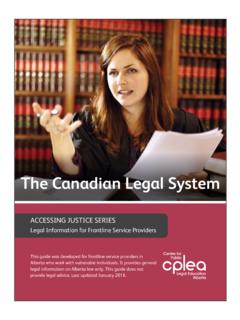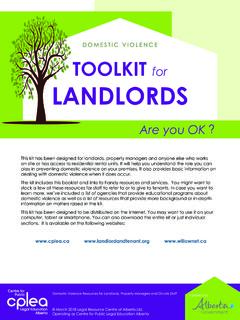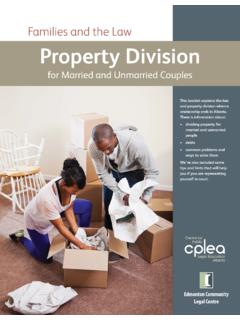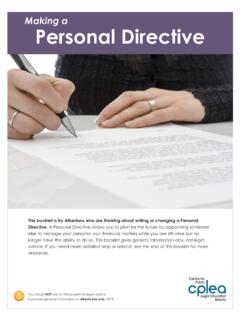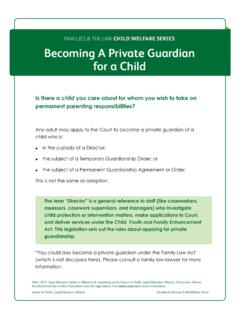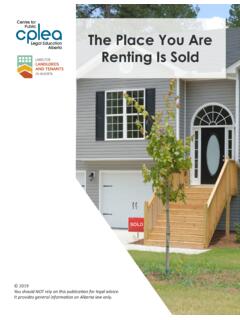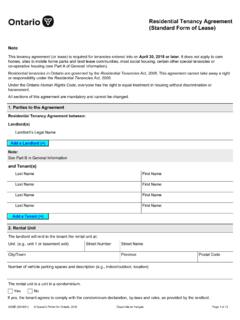Transcription of Renting 101 - cplea.ca
1 Renting 101A Guide to Renting in Alberta4th EditionCentre forPublicLegal should NOT rely on this booklet for legal advice. It provides general information on Alberta law only. 4th Edition, March contents of this booklet are provided as general information only. It is not legal advice. If you have a legal problem, you should consult a information contained in this booklet was correct at the time it was produced. Be aware that there may have been subsequent changes which make the information outdated at the time you are reading it. Legal Resource Centre of Alberta will not be responsible for any loss arising from reliance on or action taken (or not taken) as a result of this would like to thank the Alberta Real Estate Foundation for generously funding the Residential Tenancies Legal Information Program.
2 Legal Resource Centre of Alberta Ltd., Edmonton, Alberta1st Edition February 20092nd Edition June 20113rd Edition February 20134th Edition March 2016 The Legal Resource Centre of Alberta, operating as the Centre for Public Legal Education Alberta, is a non-profit organization whose mission is to help people understand the law as it affects their everyday lives. We develop plain language booklets, presentations and other learning materials to help people recognize and respond to their legal rights and responsibilities. We have a variety of programs, and provide legal information and referral on many legal topics. For more information, please go to would also like to thank the Alberta Law Foundation and the Department of Justice Canada for providing operational funding, which makes all of our projects forPublicLegal iBefore You Move In.
3 1 Laws Apply to Renters ..1 What is the Residential tenancies act (RTA)? ..2 Other Laws That May Apply to You ..3 Moving Lease ..5 Who is a Tenant? ..7 Security Deposits ..8 Pets ..8 Inspections: What You Need to Know ..9 Living There ..10 Your Obligations as a Tenant ..10 Your Landlord s Obligations ..11 Landlord s Right to Enter the Rental Property ..13 Serving Notice ..14 Rent ..14 Moving Out ..15 Ending the Lease .. Deposit ..17 Disputes ..19 Dealing with Disputes with Your Landlord ..19 Ways Landlords Can Resolve Disputes with Tenants ..20 Courts and RTDRS ..22 The Rentcylopedia ..24 Contacts .. 1 One of the most important things you can do before you rent is to learn about the laws that apply to you and your rental situation.
4 These laws govern the relationship between you and your landlord and protect you as a renter. If you know the law, you can enter into your rental agreement with confidence, or if you are already Renting , you can learn about the entire lifespan of Renting from signing a lease, to moving in your furniture, to giving your notice, and moving out. This booklet takes the laws that apply to renters in Alberta and presents them in a useful, quick-reference format. Renting 101: A Guide to Renting in Alberta will walk you through the rental process so you, as a renter, can live responsibly and you read this booklet, make sure you know what laws apply to you as a that Apply to RentersIf you have decided to rent, it is important to know the laws that apply to you.
5 Knowing the bylaws, acts, and standards that apply to you as a renter may save you time and possibly money. In Alberta, there are many laws that protect and govern you as a renter. For the most part, the Residential tenancies act (RTA) is the law that affects renters. However, there are some living situations where the RTA will not apply. Also, there are other laws that will apply to everyone, such as the Alberta Human Rights Act and the Personal Information Protection Act. The next section contains questions you can ask yourself to help understand what laws will apply to your living situation. Before You Move In1In this booklet, most of the information that is provided relates to situations covered under the Residential tenancies act .
6 If your situation is not covered by this Act, make sure that you understand which laws apply to you. 2 Renting 101 What is the Residential tenancies act (RTA)?The RTA is the law that outlines the rights and responsibilities of the majority of landlords and tenants in Alberta. The RTA covers a lot of issues, including: security deposits; types of leases; notice periods to end a lease; inspections; and minimum standards of conduct for landlords and RTA is regulated by Service Alberta, a ministry of the Alberta government, and you can call Service Alberta s Consumer Contact Centre (1-877-427-4088) if you are having a Renting issue. Before you call the Consumer Contact Centre, make sure you have taken every step to deal with and understand the problem.
7 You may need to contact a different department if a different law has been broken. For example, if you have a health and sanitation issue, an inspector from Alberta Health Services will investigate. Do you rent a self-contained apartment, house, basement suite, condominium or subsidized public housing? Are you living in a student dormitory? Do you live in a place where you share personal living space with your landlord? (In other words, do you share a bathroom, kitchen or living room with your landlord?NoYesThe RTA applies to you. Other laws may apply to you as well, depending on the type of property you rent. The RTA does not apply to you. This means that the lease you have with the landlord (a college or university), contains the rules that you must follow.)
8 You may also have to follow certain school RTA does not apply to you. It is important to make a written agreement with the landlord to protect yourself. A sample Living with Your Landlord agreement is available at If your living situation is not described in any of these questions, you can contact Service Alberta s Consumer Contact Centre at 1-877-427-4088 for more 3 Other Laws That May Apply to YouLaws According to Your Living SituationDifferent laws will apply to you depending on what kind of property you are Renting . Residential Tenancies ActCondominium Property ActInnkeepers ActMobile Home Sites Tenancies ActCollege/ Univesity RulesAlberta Housing ActApartmentlBasement suitelCondominiuml lHouselHotel roomlHotel room if rented for more than six monthslMobile home sitelSharing with your landlordStudent dorm roomlSubsidized public housingllCondominium Property ActThis Act outlines additional rules that you must follow when you rent a condo.
9 For example, a condominium board can end your tenancy, even if your landlord does not want to end it. Also, each condominium corporation has its own bylaws that tenants must follow. Cooperatives ActThis Act sets out specific provisions for terminating a cooperative membership and evicting a member. Cooperatives also have their own bylaws that must be followed. The RTA may, or may not, apply to you if you live in cooperative ActThis Act outlines you and your landlord s obligations when you are paying for lodging in a hotel or motel for under six months. If you are living in a hotel or motel for more than six consecutive months, then you must follow the RTA. Note: The Innkeepers Act usually does not apply to situations where a tenant shares living space with a Home Sites Tenancies ActThis law sets out the rights and responsibilities of people who rent a mobile home site.
10 College/University RulesIf you are living in student housing, or on campus, you should make sure you know what school rules apply to you. Alberta Housing ActAdditional rules apply if you re living in subsidized housing. For example, a landlord may be able to evict you if you don t tell them if your income or employment situation changes. 4 Renting 101 Laws that Deal with Specific IssuesIn addition to the laws that apply to you because of what kind of property you rent, there are also laws that deal with specific issues (for example, building safety and personal privacy). Alberta Building Code (ABC)The ABC sets out standards for the design and construction of buildings, and changes to buildings.
